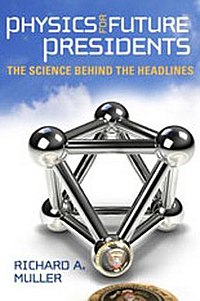
Frederick Seitz was an American physicist and a pioneer of solid state physics.

Nuclear terrorism refers to any person or persons who detonate a nuclear weapon as an act of terrorism. Some definitions of nuclear terrorism include the sabotage of a nuclear facility and/or the detonation of a radiological device, colloquially termed a dirty bomb, but consensus is lacking. In legal terms, nuclear terrorism is an offense committed if a person unlawfully and intentionally "uses in any way radioactive material … with the intent to cause death or serious bodily injury; or with the intent to cause substantial damage to property or to the environment; or with the intent to compel a natural or legal person, an international organization or a State to do or refrain from doing an act", according to the 2005 United Nations International Convention for the Suppression of Acts of Nuclear Terrorism.

Sir David Anthony King is an Emeritus Professor in physical chemistry at the University of Cambridge, previously Director of the Collegio Carlo Alberto, Chancellor of the University of Liverpool and a senior scientific adviser to UBS. He previously served as the Foreign Secretary's Special Representative for Climate Change and Chairman of the Future Cities Catapult.

Richard A. Muller is an American physicist and emeritus professor of physics at the University of California, Berkeley. He was also a faculty senior scientist at the Lawrence Berkeley National Laboratory. In early 2010, Muller and his daughter Elizabeth founded the group Berkeley Earth, an independent 501(c)(3) non-profit aimed at addressing some of the major concerns of the climate change skeptics, in particular the global surface temperature record.
The Mainau Declaration is either of two socio-political appeals by Nobel laureates who participated in the Lindau Nobel Laureate Meetings, the annual gathering with young scientists at the German town of Lindau. The name denotes that these declarations were presented on Mainau Island in Lake Constance, the traditional venue of the last day of the one-week meeting.
JASON is an independent group of elite scientists which advises the United States government on matters of science and technology, mostly of a sensitive nature. The group was created in the aftermath of the Sputnik launch as a way to reinvigorate the idea of having the nation's preeminent scientists help the government with defense problems, similar to the way that scientists helped in WWII but with a new and younger generation. It was established in 1960 and has somewhere between 30 and 60 members. Its work first gained public notoriety as the source of the Vietnam War's McNamara Line electronic barrier. Although most of its research is military-focused, JASON also produced early work on the science of global warming and acid rain. Current unclassified research interests include health informatics, cyberwarfare, and renewable energy.
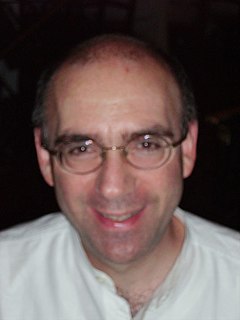
Joseph J. Romm is an American author, blogger, editor, physicist and climate expert, who advocates reducing greenhouse gas emissions to limit global warming and increasing energy security through energy efficiency, green energy technologies and green transportation technologies. Romm is a Fellow of the American Association for the Advancement of Science. In 2009, Rolling Stone magazine named Romm to its list of "100 People Who Are Changing America", and Time magazine named him one of its "Heroes of the Environment (2009)", calling him "The Web's most influential climate-change blogger".
Evangelical environmentalism is an environmental movement in the United States in which some Evangelical Christians have emphasized biblical mandates concerning humanity's role as steward and subsequent responsibility for the care taking of Creation. While the movement has focused on different environmental issues, it is best known for its focus of addressing climate action from a biblically-grounded theological perspective.

Steven Chu is an American physicist, Nobel laureate, and the 12th United States Secretary of Energy. He is currently the William R. Kenan, Jr., Professor of Physics and Professor of Molecular and Cellular Physiology at Stanford University. He is known for his research at the University of California at Berkeley and his research at Bell Laboratories and Stanford University regarding the cooling and trapping of atoms with laser light, for which he shared the 1997 Nobel Prize in Physics with Claude Cohen-Tannoudji and William Daniel Phillips.

Hell and High Water: Global Warming – the Solution and the Politics – and What We Should Do is a book by author, scientist, and former U.S. Department of Energy official Joseph J. Romm, published December 26, 2006. The author is "one of the world's leading experts on clean energy, advanced vehicles, energy security, and greenhouse gas mitigation."
Michael A. Levi was a Special Assistant to the President for Energy and Economic Policy in the Obama White House. He was previously the David M. Rubenstein senior fellow for energy and environment at the Council on Foreign Relations (CFR), a nonpartisan foreign-policy think tank and membership organization, and director of its Maurice R. Greenberg Center for Geoeconomic Studies. He is an expert on energy and climate, highly regulated technology, and defense and security policy.
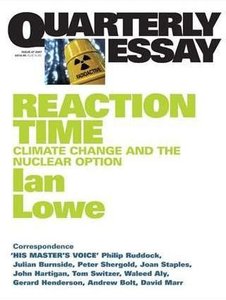
Reaction Time: Climate Change and the Nuclear Option is a book by Professor Ian Lowe which was officially launched by science broadcaster Robyn Williams at the Writers' Festival in Brisbane in September 2007. The book is about energy policy, and Lowe argues that nuclear power does not make sense on any level: economically, environmentally, politically or socially.

Harold ("Hal") Warren Lewis was an American Emeritus Professor of Physics and former department chairman at the University of California, Santa Barbara (UCSB). He was chairman of the JASON Defense Advisory Group from 1966 to 1973, and was active in US government investigations into safety of nuclear reactors.
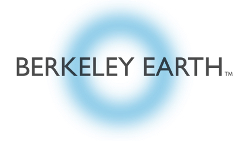
Berkeley Earth is a Berkeley, California-based independent 501(c)(3) non-profit focused on land temperature data analysis for climate science. Berkeley Earth was founded in early 2010 with the goal of addressing the major concerns from outside the scientific community regarding global warming and the instrumental temperature record. The project's stated aim was a "transparent approach, based on data analysis." In February 2013, Berkeley Earth became an independent non-profit. In August 2013, Berkeley Earth was granted 501(c)(3) tax-exempt status by the US government. The primary product is air temperatures over land, but they also produce a global dataset resulting from a merge of their land data with HadSST.
Gordon James Fraser MacDonald was an American geophysicist and environmental scientist, best known for his principled skepticism regarding continental drift, involvement in the development of the McNamara Line electronic defense barrier during the Vietnam War, and early research and advocacy on manmade global climate change. MacDonald was admired for his creative mind, and his ability to connect scientific issues and matters of public policy.
M. V. Ramana is a physicist who works at the Nuclear Futures Laboratory and the Program on Science and Global Security, both at Princeton University, on the future of nuclear power in the context of climate change and nuclear disarmament. Ramana is a member of the International Panel on Fissile Materials and the Bulletin of the Atomic Scientists’ Science and Security Board.
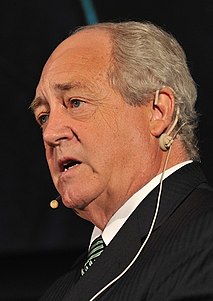
There are large variations in peoples’ understanding of the issues surrounding nuclear power, including the technology itself, climate change, and energy security. Proponents of nuclear energy contend that nuclear power is a sustainable energy source that reduces carbon emissions and increases energy security by decreasing dependence on imported energy sources. Opponents believe that nuclear power poses many threats to people and the environment. While nuclear power has historically been opposed by many environmentalist organisations, some support it, as do some scientists.

A planetary civilization or global civilization is a civilization of Type I on Kardashev scale, with energy consumption levels near that of a contemporary terrestrial civilization with an energy capability equivalent to the solar insolation on Earth (between 1016 and 1017 watts). In social aspect – the worldwide, global, increasingly interconnected, international, highly technological society.
Solutions to global issues generally require cooperation among nations.
